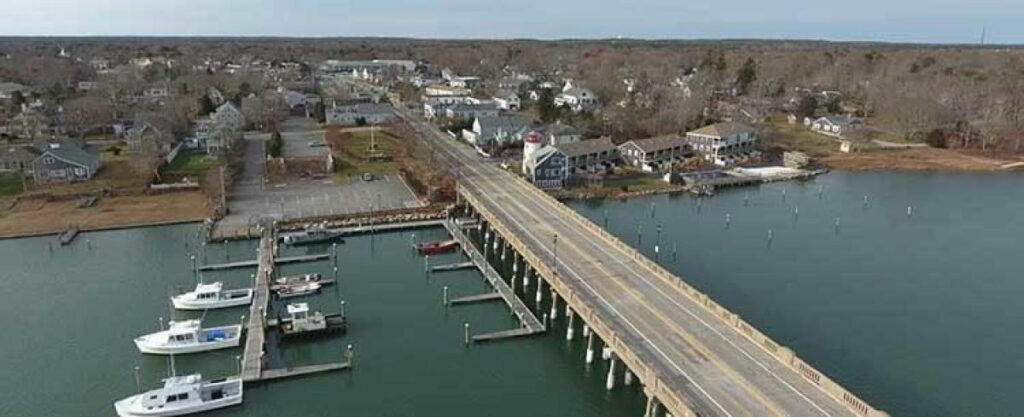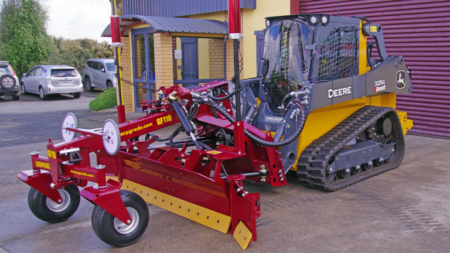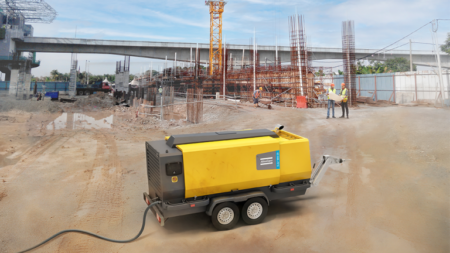Photo courtesy of the Town of Yarmouth
Bass River Bridge at Yarmouth.
The Bass River Bridge has served as a vital transportation link on Cape Cod for nearly 90 years, connecting the communities of West Dennis and South Yarmouth along the traffic-choked Massachusetts Highway 28 corridor since the mid-1930s.
But nine decades of use does not come without serious wear and tear. A quick peek beneath the structure reveals crumbling concrete pilings, exposed rebar and chipped crossmembers. Up top, hundreds of cars drive over the cracked concrete deck each day.
The bridge was classified as structurally deficient and considered in poor condition by the Federal Highway Administration (FHWA) in November 2021, according to data provided by the agency.
Due to these structural deficiencies, the state Department of Transportation (MassDOT) is performing maintenance on the bridge, with a $40 million project to completely replace it scheduled for bidding later this year, the Cape Cod Times learned.
Maintenance Work to Come First
Jeffrey Colby, the director of public works for the town of Yarmouth, said maintenance on the bridge will include “significant” work on the underside concrete slabs and pilings as well as the deck, extensively reinforcing the structure until the time comes when construction can begin to totally replace the bridge.
He does not expect any replacement to get under way until the spring of 2025.
Bids to install a new bridge are scheduled to go out this fall, Colby explained.
“There’s a several month time period in which bidders are responding, then there’s the award process, and that type of thing takes a while with MassDOT projects,” he added.
Most of the repairs to the Bass River Bridge will be done below the roadway surface, which will mean minimal impacts on traffic, MassDOT spokesperson John Goggin told the Times in an email. He said traffic delays will only “occur intermittently” and be announced in advance.
“Beyond typical road surface maintenance, reinforced concrete deck repairs will be performed to the underside of the existing deck slab as well as selective pile repairs,” Goggin added. “These are necessary to remove the existing barriers from the bridge and facilitate construction phasing.”
The bridge is safe in its current state, but structural deficiencies are better handled in the long term by replacing it rather than continued maintenance.
“A bridge replacement project is the most efficient method of eliminating these deficiencies,” he explained. “It will also improve other non-structural features of the bridge like lane configurations, sidewalks and railings.”
No Construction During Summer
Colby said the replacement project will take place in phases, the first being the replacement of one half of the bridge while maintaining traffic flow on the other portion, before switching the work to the other half of the structure. Pedestrian and bike traffic also will continue throughout construction.
“[The prime contractor would be] committed to keeping two lanes of traffic open on that bridge at nearly all times,” he explained. “If there’s an opportunity to go down to one lane or alternating traffic, they’ll have to let us know about that.”
And because the bridge site on Cape Cod is along a busy tourist route, no maintenance or construction will be done during the summer, Colby said.
“They’re not allowed to work or impact traffic throughout that period; that’s why they have the timing of this repair work,” he added. “Doing work in January is not ideal, but they have to have things done before Memorial Day.”
As one of only three crossings of the Bass River, the bridge carries significant traffic during the summer tourist season and provides an important link year-round between the towns east of the river and Cape Cod Hospital in Hyannis, according to MassDOT.
It has one travel lane in each direction and only a single sidewalk located on its southern side. Though safe for everyone, the bridge is reaching the end of its useful lifespan and must eventually be replaced.
Upgrades Extend to Nearby Intersections
MassDOT describes the Bass River Bridge replacement and intersections project as one that will not only improve the highway as it passes over the bridge and through the main streets intersection in Yarmouth but will “provide multimodal access along the corridor while improving safety and comfort for all users.”
The state agency proposes to widen the bridge deck from 49 to 60 ft. to include two travel lanes in each direction, new shoulders, a sidewalk on the northern side of the bridge, a shared-use path on the southern side, and new ornamental light fixtures and railings on both sides of the structure.
The new bridge will have a higher vertical clearance and fewer piers than the current one, and the distance between piers will be widened from 18 to 54 ft.
In addition, the junction of North Main Street and Station Avenue also will be addressed as they presently intersect at an acute angle, creating a poor sight distance. MassDOT believes that improvements at these intersections will create more safety for all users.
Read the full article here











